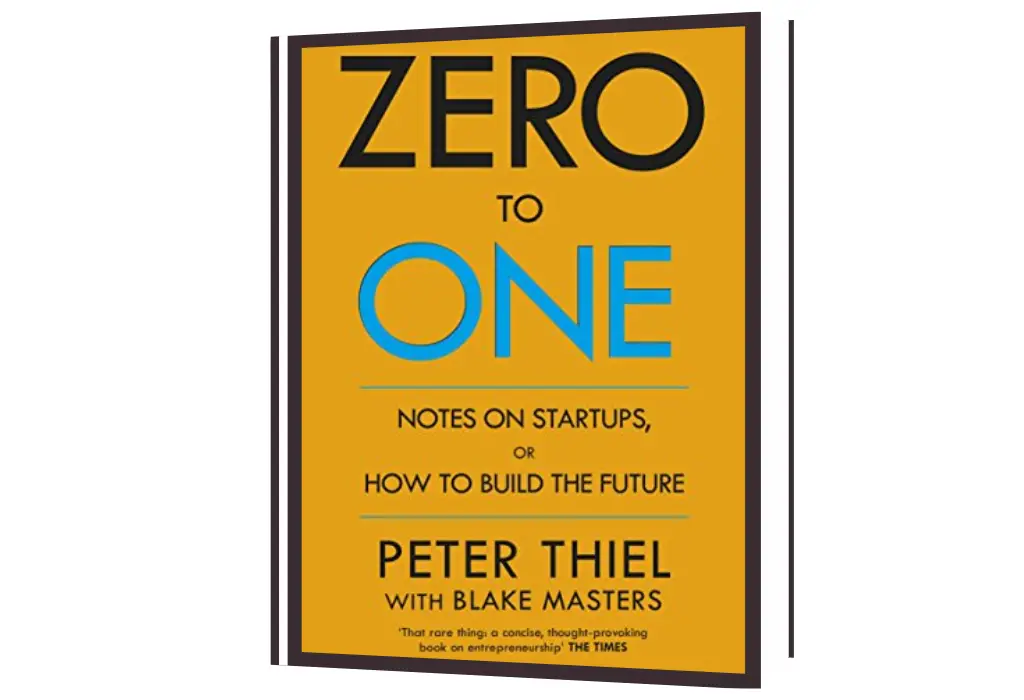Publishing Date: September 16, 2014
Introduction
*Zero to One: Notes on Startups, or How to Build the Future* is a book written by Peter Thiel, co-founder of PayPal, with Blake Masters, who was a student in Thiel’s Stanford University class on startups. The book encapsulates Thiel’s business philosophy and the unique insights he has garnered throughout his career. It is a blend of entrepreneurship lessons, innovation philosophy, and a broader commentary on the state of technology and the future.
The title “Zero to One” refers to Thiel’s concept of creating something new and unique—moving from nothing (zero) to something (one). This is contrasted with going from one to “n,” which Thiel describes as incremental progress rather than true innovation. Thiel argues that true innovation happens when one creates a monopoly through innovation rather than by competing in a crowded market.
The Premise of Zero to One
Thiel’s central thesis is that progress can occur in two forms: horizontal or vertical. Horizontal progress is the expansion of existing ideas and technologies, often seen as globalization, where ideas are copied and spread across the world. Vertical progress, on the other hand, involves creating new ideas, leading to innovation. Thiel asserts that while globalization is important, it is innovation that truly drives human progress. His argument is that to build a better future, we need more “zero to one” progress, where new technologies, ideas, and businesses are created.
Chapter Summaries
Chapter 1: The Challenge of the Future
Thiel begins by challenging the conventional wisdom that we live in an age of technological progress. He argues that while we have seen tremendous advances in the digital world, especially with the internet, other sectors like energy, space exploration, and medicine have not seen the same level of innovation. Thiel points out that many companies today focus on copying or slightly improving existing products rather than creating something entirely new. This is the essence of moving from one to “n” instead of zero to one.
Thiel stresses the importance of thinking critically about the future and not simply accepting the status quo. He encourages entrepreneurs to look for secrets—things that are unknown or misunderstood—that can be the basis for breakthrough innovation.
Chapter 2: Party Like It’s 1999
In this chapter, Thiel reflects on the dot-com bubble and its subsequent crash. He discusses the irrational exuberance that led to the bubble, where many startups focused more on achieving short-term growth than on creating long-term value. Thiel criticizes the “lean startup” methodology that became popular in the wake of the crash, arguing that while it emphasizes efficiency, it often discourages big, bold ideas that could lead to truly innovative companies.
Thiel advocates for a more thoughtful approach to building a company, one that starts with a vision for the future and a plan to create something genuinely new and valuable.
Chapter 3: All Happy Companies Are Different
Thiel introduces one of the book’s key concepts: the importance of monopolies. Contrary to popular belief, Thiel argues that monopolies are not only good for the companies that hold them but also for society as a whole. He explains that monopolies are able to focus on long-term innovation and value creation because they are not constantly under pressure from competitors.
He contrasts this with companies in competitive markets, which must focus on short-term survival and incremental improvements. Thiel emphasizes that successful startups should aim to create monopolies by developing unique products or services that are difficult or impossible for competitors to replicate.
Chapter 4: The Ideology of Competition
Thiel expands on his argument against competition, suggesting that the obsession with competition is deeply ingrained in our culture. He discusses how competition can be destructive, leading companies to focus on beating their rivals rather than on creating value. Thiel argues that competition often leads to a race to the bottom, where companies slash prices and cut corners in an effort to outdo each other.
He encourages entrepreneurs to avoid competing in crowded markets and instead focus on creating something new and unique. By doing so, they can create a monopoly and avoid the destructive effects of competition.
Chapter 5: Last Mover Advantage
Thiel introduces the concept of the “last mover advantage,” which is the idea that the last company to enter a market can often become the most successful. He explains that while being first to market can offer some advantages, it is often the companies that enter later—after learning from the mistakes of others—that achieve the greatest success.
Thiel emphasizes the importance of timing in building a successful company. He suggests that entrepreneurs should aim to be the last mover in their market by creating a product or service that is so superior that it becomes the standard, making it difficult for others to compete.
Chapter 6: You Are Not a Lottery Ticket
Thiel argues against the idea that success is largely a matter of luck. He criticizes the notion that successful entrepreneurs are simply fortunate individuals who happened to be in the right place at the right time. Instead, Thiel believes that success is largely the result of careful planning, hard work, and a willingness to take risks.
He encourages entrepreneurs to take control of their own destinies by making deliberate choices and pursuing bold ideas. Thiel suggests that while luck may play a role in success, it is ultimately the decisions we make that determine our outcomes.
Chapter 7: Follow the Money
Thiel discusses the importance of understanding the financial aspects of building a successful company. He emphasizes the need for startups to generate revenue and achieve profitability rather than simply relying on external funding. Thiel argues that while venture capital can be valuable, it should not be seen as a substitute for a solid business model.
He also discusses the importance of aligning incentives between founders, investors, and employees. Thiel suggests that equity should be distributed in a way that motivates everyone involved to work towards the long-term success of the company.
Chapter 8: Secrets
Thiel returns to the idea of secrets introduced in Chapter 1, arguing that the most valuable companies are those that discover and exploit secrets—ideas that are not widely understood or accepted. He suggests that the search for secrets is the key to innovation, as it leads to the discovery of new opportunities that others have overlooked.
Thiel encourages entrepreneurs to think critically about the world and to question conventional wisdom. He suggests that the most successful startups are those that identify a secret and build a business around it.
Chapter 9: Foundations
In this chapter, Thiel discusses the importance of building a strong foundation for a startup. He argues that the decisions made in the early stages of a company’s development can have a profound impact on its long-term success. Thiel emphasizes the importance of assembling the right team, establishing a clear vision, and creating a strong company culture.
He also discusses the importance of legal and financial structures, suggesting that these should be carefully considered from the outset. Thiel argues that while these aspects may seem less glamorous than product development or marketing, they are crucial to building a sustainable business.
Chapter 10: The Mechanics of Mafia
Thiel uses the term “mafia” to describe the tight-knit, mission-driven teams that he believes are essential to building successful startups. He argues that the most successful companies are those that foster a strong sense of identity and purpose among their employees. Thiel suggests that this sense of identity helps to attract and retain top talent, as well as to create a cohesive and motivated team.
He contrasts this with larger, more bureaucratic organizations, which he argues often suffer from a lack of focus and a tendency to prioritize process over results. Thiel emphasizes the importance of maintaining a small, committed team that is aligned with the company’s vision.
Chapter 11: If You Build It, Will They Come?
Thiel discusses the importance of distribution, arguing that even the best product or service will fail if it cannot reach its intended audience. He criticizes the “build it and they will come” mentality, suggesting that too many startups focus on product development at the expense of distribution.
Thiel emphasizes the need for startups to develop effective distribution strategies, whether through traditional marketing channels, partnerships, or other means. He suggests that distribution should be considered from the outset, rather than as an afterthought.
Chapter 12: Man and Machine
Thiel discusses the relationship between humans and technology, arguing that the most successful companies are those that leverage the strengths of both. He suggests that while automation and artificial intelligence are powerful tools, they are most effective when used in conjunction with human creativity and judgment.
Thiel criticizes the idea that technology will inevitably replace human workers, arguing instead that technology should be seen as a complement to human abilities. He suggests that startups should focus on developing technologies that enhance human productivity and creativity, rather than simply replacing human labor.
Chapter 13: Seeing Green
Thiel discusses the challenges and opportunities associated with clean technology, or “cleantech.” He reflects on the failures of many cleantech startups in the early 2000s, attributing their struggles to a combination of poor business models, unrealistic expectations, and a lack of understanding of the market.
Thiel suggests that while cleantech remains a valuable and important field, startups in this space need to be more thoughtful and strategic in their approach. He emphasizes the importance of developing technologies that are not only environmentally sustainable but also economically viable.
Chapter 14: The Founder’s Paradox
In the final chapter, Thiel discusses the unique challenges and opportunities faced by founders. He explains that while founders have the potential to create enormous value, they also face significant risks and challenges. Thiel discusses the paradox of the founder — the idea that the traits that make someone a successful entrepreneur can also lead to their downfall. He explains that founders need to be both visionary and pragmatic, confident and humble, and willing to take risks while also managing them carefully. Thiel concludes by emphasizing the importance of maintaining a long-term perspective and of staying true to your vision, even in the face of challenges and setbacks.







